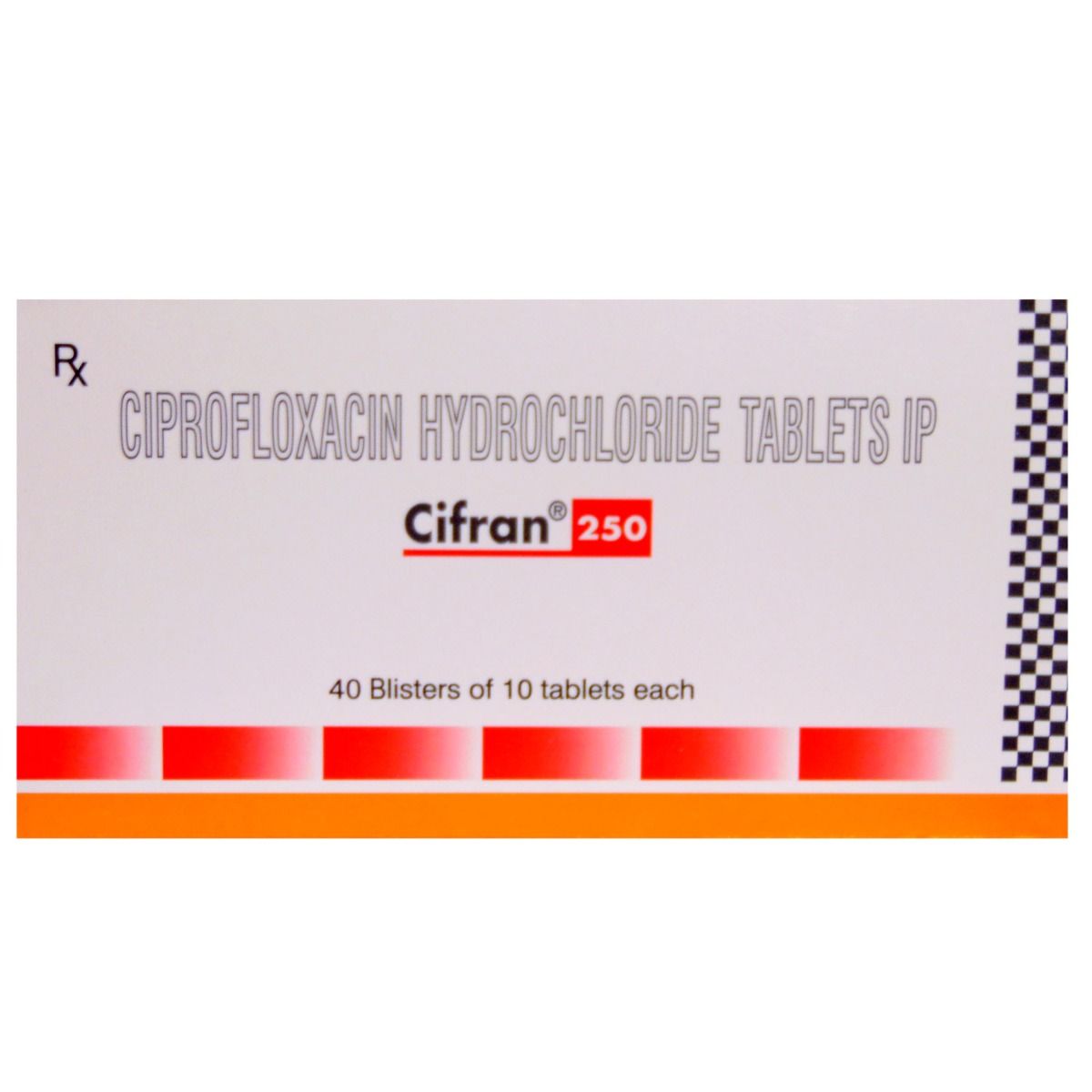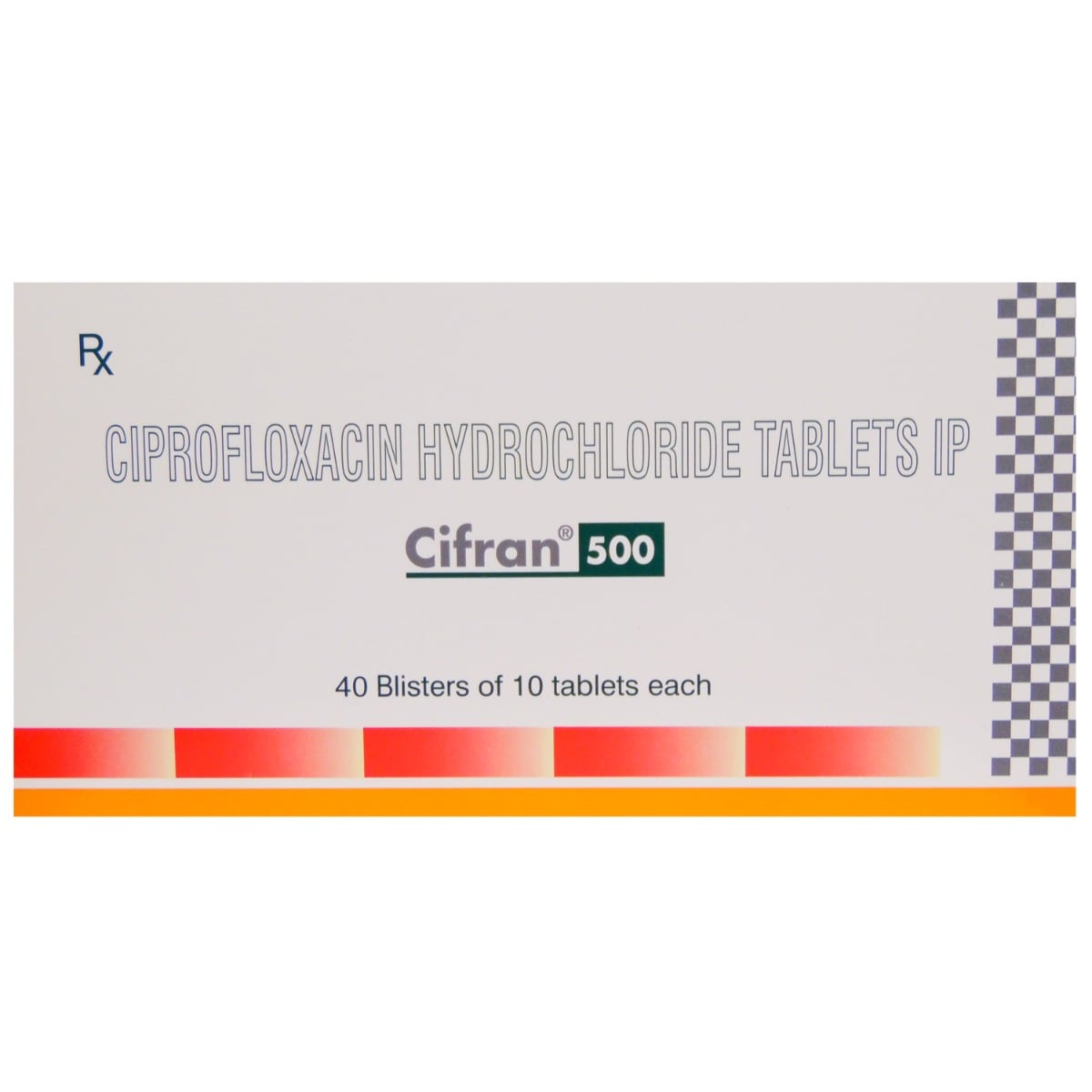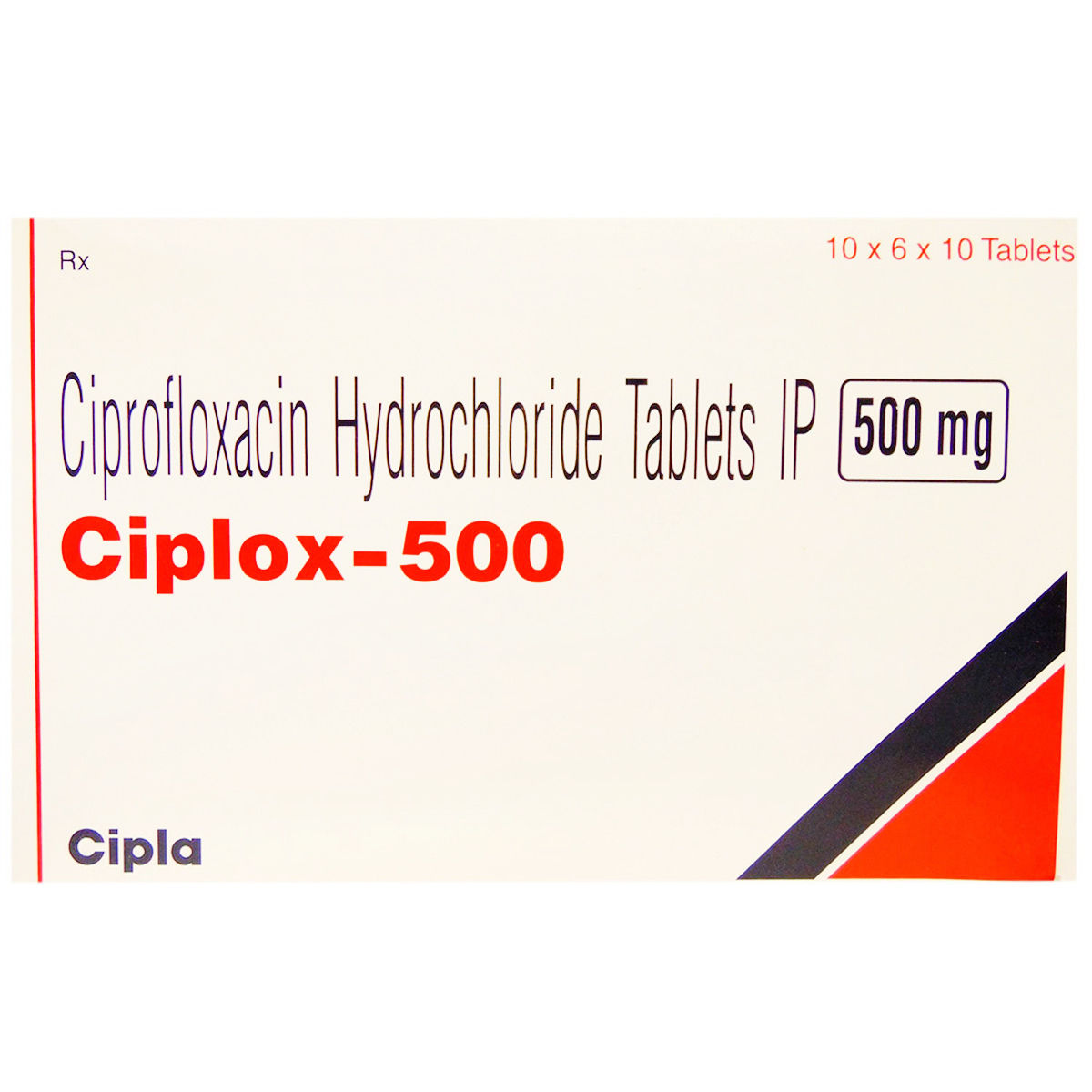Ciprofloxacin
About Ciprofloxacin
Ciprofloxacin is used to treat or prevent certain infections caused by bacteria. It is prescribed for the treatment of pneumonia, gonorrhoea (a sexually transmitted disease), typhoid fever (a serious infection that is common in developing countries), infectious diarrhoea (infections that cause severe diarrhoea), and infections of the skin, bone, joint, abdomen (stomach area), and prostate (male reproductive gland).
Ciprofloxacin contains an antibiotic, 'Ciprofloxacin', which is bactericidal in nature and works by killing bacteria that cause infections. It prevents the division of bacterial cells. It also inhibits the repair of bacterial cells. Altogether, it kills the bacteria.
Ciprofloxacin should be taken in the dose and duration as advised by your doctor. In some cases, you may experience nausea, diarrhoea, abnormal liver function tests, vomiting, and rash. Most of these side effects of Ciprofloxacin do not require medical attention and gradually resolve over time. However, if the side effects are persistent, reach out to your doctor.
It is not advisable to stop this medicine suddenly to avoid unpleasant side effects. Inform your doctor if you have any lung disease, muscle weakness (myasthenia gravis), sleeping disorder or difficulty in sleeping (sleep apnoea), severe liver disease, or problem with alcohol or other prescription recreational drugs. Inform your doctor if you are planning to get pregnant, are pregnant or breastfeeding. If you experience any symptoms of an allergic reaction such as rashes, itching, swelling, shortness of breath, etc. you should contact a doctor immediately.
Uses of Ciprofloxacin
Medicinal Benefits
Ciprofloxacin contains the antibiotic Ciprofloxacin, which helps treat and prevent a wide range of bacterial infections. It is bactericidal in nature and works by killing bacteria that cause infections. It prevents the division of bacterial cells and inhibits the repair of bacterial cells. Both these actions lead to the killing of the bacteria.
Directions for Use
Storage
Side Effects of Ciprofloxacin
- Nausea
- Diarrhoea
- Vomiting
- Rash
- Liver function tests abnormal
- Change of the heart rhythm (ECG)
- Low blood potassium level
Drug Warnings
Do not take Ciprofloxacin if you are allergic or have had a severe reaction to ciprofloxacin or any other quinolone or fluoroquinolone antibiotic such as delafloxacin gemifloxacin, levofloxacin, moxifloxacin and ofloxacin. Taking Ciprofloxacin may increase the chances of developing tendinitis (swelling of a fibrous tissue that connects a bone to a muscle) or have a tendon rupture (tearing of a fibrous tissue that connects a bone to a muscle). Inform your doctor if you have or have ever had a kidney, heart, or lung transplant, kidney disease, a joint or tendon disorder such as rheumatoid arthritis (auto immune disorder of joints causing pain, swelling, and loss of function), seizures (fits), epilepsy or if you participate in regular physical activity. Taking Ciprofloxacin may worsen muscle weakness in people with myasthenia gravis (a disorder of the nervous system that causes muscle weakness) and cause severe difficulty breathing or death. Dairy products should be avoided along with Ciprofloxacin. And also, exposure to sunlight should be avoided while taking Ciprofloxacin as it may cause increased phototoxicity or photosensitivity. Patients with epilepsy, and irregular heartbeat (especially a condition known as QT prolongation) should tell their doctor before taking Ciprofloxacin.
Drug Interactions
Drug-drug interactions: This medicine may have an interaction with blood thinners (such as warfarin), antidepressants and antipsychotics (like clozapine, olanzapine), caffeine-containing medications, insulin or other anti-diabetic medications (like chlorpropamide, glimepiride, glipizide, glyburide, tolazamide, and tolbutamide), medications for regulating irregular heartbeat (like amiodarone, disopyramide, procainamide, quinidine), pain killers (like ibuprofen and naproxen).
Drug-Food Interactions: Ciprofloxacin interacts with dairy products (like milk or yoghurt) or calcium-fortified juices alone.
Drug-Disease Interactions: Inform your doctor if you have or have ever had a kidney, heart, or lung transplant, kidney disease, a joint or tendon disorder such as rheumatoid arthritis (a condition in which the body attacks its joints, causing pain, swelling, and loss of function), seizures, epilepsy or if you participate in regular physical activity before starting Ciprofloxacin.
Drug-Drug Interactions Checker List:
Safety Advice

Alcohol
cautionAlcohol is not knwon to cause any unpleasant side effect if taken along with Ciprofloxacin. But intake of alcohol with Ciprofloxacin may damage your liver. So intake of Ciprofloxacin should be avoided with Ciprofloxacin.

Pregnancy
cautionCiprofloxacin is a pregnancy Category C medicine. It is unknown whether the Ciprofloxacin will affect pregnant women or fetus. Hence, You should avoid intake of Ciprofloxacin if you are pregnant or planning to become pregnant as it may harm the baby.

Breast Feeding
cautionCiprofloxacin is excreted in human milk. But the amount of Ciprofloxacin absorbed by the nursing infant is unknown. So, should not be taken while breastfeeding.

Driving
unsafeCiprofloxacin can affect alertness and coordiantion. So, operating machinery which requires concentration should be avoided.

Liver
cautionCiprofloxacin to be taken with caution, especially if you have a history of liver diseases/conditions. The dose may have to be adjusted by your doctor if there are symptoms of nausea, vomiting, loss of appetite, dark-coloured urine, yellowing of or skin/eye.

Kidney
cautionCiprofloxacin to be taken with caution, especially if you have a history of Kidney diseases/conditions. The dose may have to be adjusted by your doctor.

Children
safe if prescribedCiprofloxacin can be given to children but under child specialist medical supervision. Ciprofloxacin is prescribed to the children to treat complicated urinary tract infections, anthrax infection, or plague infection.
Habit Forming
Diet & Lifestyle Advise
Do not drink or eat a lot of caffeine-containing products such as coffee, tea, energy drinks, cola, or chocolate. Ciprofloxacin may increase nervousness, sleeplessness and anxiety caused by caffeine.
Probiotics should be taken after taking the full course of Ciprofloxacin to restore some healthy bacteria in the intestines that may have been killed. Taking probiotics after antibiotic treatment can reduce the risk of antibiotic-associated diarrhoea. Certain fermented foods like yoghurt, cheese, sauerkraut, kombucha and kimchi can help restore the intestine's good bacteria.
Include more fibre-enriched food in your diet, as it can be easily digested by your gut bacteria, which helps stimulate their growth. Thus, fibre-rich foods may help restore healthy gut bacteria after a course of antibiotics. Whole grains like whole-grain bread and brown rice should be included in your diet. Make sure you drink plenty of water or other fluids daily while taking Ciprofloxacin.
Avoid intake of alcoholic beverages with Ciprofloxacin as it can make you dehydrated and may affect your sleep. This can make it harder for your body to aid the Ciprofloxacin in fighting off infections.
Patients Concern
Disease/Condition Glossary
Bacterial infection: A bacterial infection is a condition in which harmful bacteria enter, multiply, and infect our body. It can target any body part and multiple very quickly. When you get infected with bacteria, you can experience generalized symptoms, like fevers, chills, and fatigue. Bacteria are of various forms, commonly spherical, rod, and spiral-shaped. Bacterial infections vary from minor illnesses like sore throat and ear infections to severe brain infections like meningitis and encephalitis. A few harmful bacteria that cause infections include Streptococcus, Staphylococcus, and E. coli. Anyone can become infected with a bacterial infection. However, people with weak immune systems or taking immunosuppressive medicine can be more prone to bacterial infection.
FAQs
Ciprofloxacin contains the class of antibiotics known as fluoroquinolones, primarily used to treat or prevent certain infections caused by bacteria.
Ciprofloxacin contains the antibiotic Ciprofloxacin, which helps treat and prevent a wide range of bacterial infections. It is bactericidal in nature and works by killing bacteria that cause infections. It prevents the division of bacterial cells.
Ciprofloxacin makes your skin sensitive to sunlight (photosensitivity). So, prolonged exposure to sunlight or ultraviolet light should be avoided. In case of emergency, you should always wear sunscreen before going out.
If you miss a dose of Ciprofloxacin, take the missed dose as soon as you remember it. However, if it is almost time for the next dose, then do not take a double dose to make up for a missed one.
No, Ciprofloxacin should be taken in the dose and duration as advised by the doctor. If you take it in more than the recommended dose, it might cause unpleasant side effects. If you think your symptoms are not improving, please consult your doctor.
No. Ciprofloxacin is an antibacterial medicine that acts only against bacterial infections and not against viral infections causing cough, cold and flu.
Yes, Ciprofloxacin may cause diarrhoea. Ciprofloxacin is an antibiotic which kills or prevents bacterial growth, so in case some good intestinal bacteria which aid in digestion might also get killed. So, drink plenty of fluids and take probiotics to prevent excessive loss of fluids from the body (dehydration).
No, Ciprofloxacin should not be taken along with dairy products as it might affect the absorption and efficacy of Ciprofloxacin. However, you can take it with a meal that includes these foods or drinks.
When taking Ciprofloxacin, be cautious and alert your doctor if you experience side effects or signs of an allergic reaction, such as hives, itching, swelling, or difficulty breathing. Also, be aware of the risk of tendinitis (swelling of a fibrous tissue that connects a bone to a muscle) and muscle weakness. Additionally, if you notice any changes in sensation or nerve damage, such as numbness, tingling, pain, burning, or weakness in the arms or legs, or a change in your ability to feel light touch, vibrations, pain, heat, or cold, stop taking the medication and contact your doctor immediately. It's essential to be aware of these potential risks and seek medical attention promptly to address any concerns.
While taking Ciprofloxacin, it's important to avoid certain things to ensure the medication works effectively and minimize potential side effects. Avoid consuming alcohol as it can increase side effects, and limit your exposure to sunlight or UV light to reduce the risk of phototoxicity. Additionally, avoid taking antacids, iron supplements, and dairy products, as they can reduce the absorption of Ciprofloxacin. Certain medications may also interact with Ciprofloxacin, so be sure to discuss any other medications you're taking with your doctor. It's also important to use effective contraception to avoid getting pregnant, as Ciprofloxacin may not be recommended during pregnancy. Finally, activities that may exacerbate tendonitis, such as intense exercise, should be avoided to minimize the risk of tendon-related side effects.
Ciprofloxacin is an antibiotic from the class of fluoroquinolone. It treats or prevents certain infections caused by bacteria.
Ciprofloxacin is an antibiotic that only treats bacterial infections. It won't work against viral infections like the common cold or flu, which often come with a fever. If you have a fever, you must consult your doctor to determine what's causing it. If your fever is from a bacterial infection, your doctor might prescribe Ciprofloxacin. But you'll need a different treatment if it's from a viral infection.
The minimum daily dose of ciprofloxacin varies depending on the specific infection being treated and the patient's medical history. Typically, it ranges from 100mg to 750 mg. However, depending on the specific circumstances, the dose may be higher or lower. It's essential to follow the dosage instructions provided by your doctor.
Ciprofloxacin is passed into breast milk, but the effects on the infant are unknown. To be safe, avoid taking Ciprofloxacin while breastfeeding. Consult your doctor if you have any concerns.
Before taking Ciprofloxacin, it's crucial to have a thorough consultation with your doctor. Share your comprehensive medical history, including any existing conditions or past illnesses. Also, provide a detailed list of your medications and supplements. Additionally, discuss your lifestyle habits, such as smoking, alcohol consumption, or recreational drug use. If you're pregnant, breastfeeding, or planning to become pregnant, be sure to disclose this information. This will enable your doctor to determine whether Ciprofloxacin suits you and provide personalized care.
No. Ciprofloxacin does not have the potential for habit forming.
Do not stop taking Ciprofloxacin until you complete the full course prescribed by your doctor, even if you start feeling better. If you feel better, inform your doctor and seek further guidance. Your doctor may suggest reducing the dose, continuing treatment, or other options tailored to your condition. Stopping too soon may cause the infection to return. If you experience persistent side effects or difficulties, report them to your doctor and seek appropriate treatment. Always consult your doctor before discontinuing Ciprofloxacin.
Ciprofloxacin is safe when used as your doctor prescribes to treat specific conditions. However, in some cases, ciprofloxacin may cause side effects such as nausea, diarrhoea, abnormal liver function tests, vomiting, and rash. These side effects are usually mild and temporary. Most of the time, they don't require medical attention and will resolve on their own over time. However, if the side effects persist or worsen, you must contact your doctor for further guidance and support.
Yes, diarrhoea is a common side effect of ciprofloxacin. This occurs because the Ciprofloxacin has the potential to impact the intestines and stomach. You should speak with your doctor if the diarrhoea is severe, persistent, or includes blood or mucus. It's crucial to stay hydrated and let your doctor know if you experience any uncomfortable symptoms.
If you're feeling better, don't stop taking Ciprofloxacin! This is a crucial moment in your recovery. Stopping too soon can lead to incomplete recovery and the return of symptoms. Instead, report your progress to your doctor and follow their advice. They will guide you in safely tapering off medication if necessary, monitor for any potential side effects, and ensure the disease is fully cleared.
Using Ciprofloxacin may raise the risk of tendinitis (inflammation of the tendon) or tendon rupture (tear), particularly during or even months following therapy. You should stop taking the drug and get in touch with your doctor immediately if you feel any pain, swelling, or soreness in a tendon. Injuries to the tendons can be avoided with quick action.
You may take Ciprofloxacin with paracetamol if your doctor prescribes it. There are no significant interactions between them.
Ciprofloxacin should be swallowed as a whole with water; do not crush, break, or chew it.
The common side effects of Ciprofloxacin include nausea, diarrhoea, abnormal liver function tests, vomiting, and rash. Most of these side effects of Ciprofloxacin do not require medical attention and gradually resolve over time. However, if the side effects persist, contact your doctor.
Yes, before taking Ciprofloxacin, inform your doctor about your medical history, allergies, medications, pregnancy or breastfeeding status, family medical history, and smoking & drinking habits. Your doctor may adjust your dosage or monitor you closely if necessary.
Ciprofloxacin is usually not recommended for pregnant or breastfeeding women. If you have any concerns, reach out to your doctor, and they will discuss the potential risks and benefits with you.
You may consume alcohol while taking Ciprofloxacin. But do not take excessive alcohol to avoid unpleasant reactions.
Take the missed dose as soon as you remember unless it's almost time for your next dose. In this case, skip the missed dose and take your next dose at the regular time. Never take a double dose to make up for a missed one.







